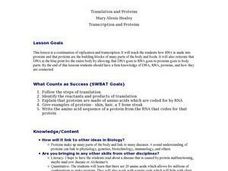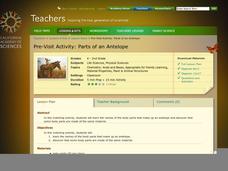Curated OER
Variation in Human Skin Color
High schoolers explore factors that control variation in human skin color and the implications of this information for human society. They understand that skin color is no longer considered a credible scientific standard by which to...
Curated OER
Hairy Evidence! Hair Identification
Provide a mystery hair and a set of reference hair samples for middle school investigators to place on a slide and examine under a microscope. Materials and procedures are detailed on the first page, while a data table for drawing what...
Curated OER
Skin, Tongue and Nose
In this skin, tongue, and nose worksheet, students answer multiple choice and short answer questions about the skin, tongue, and nose. students complete 19 questions.
Nemours KidsHealth
Skin Cancer: Grades 6-8
Do we really need sunscreen? What are the risks of tanning? Learners explore these questions through a series of informational texts and engaging, hands-on activities.
Curated OER
Protection, Support, and Locomotion
In this human body instructional activity, learners will review 5 terms associated with the skin by filling in the blank. Then students will read 14 statements about the human skeleton and muscles and determine if its true or false.
Curated OER
Integumentary System: A System, An Organ, the Biggest!
It is only six short slides, but an acceptable outline of the integumentary system. General facts about the system, layers, sublayers, and functions are listed as bullet-points. What would make this presentation more engaging for your...
Curated OER
Mission to Planet Dermis
A fabulous worksheet on the parts of the skin awaits your students. For this vocabulary/diagram of the skin worksheet, students identify parts of the skin. They answer 15 fill-in-the-blank questions based on the diagram at the top of the...
Pleasant Valley Community School District
Integumentary System
This document can be used as a slide show to introduce your human body systems class to the integumentary system, also know as skin. Topics outlined include the roles of skin, details about its its layers, and color (cause and...
Curated OER
Translation and Proteins
Learners follow the steps of translation and identify the reactants and products of translation. They able to explain that proteins are made of amino acids which are coded for by RNA. Students are able to give examples of proteins--...
Film English
Real Beauty
Consider the theme of beauty with discussion about what makes person beautiful and the well-known short film put together by Dove skin care. Class members examine some of the images from the film and discuss the message of the...
California Academy of Science
Parts of an Antelope
There are so many wonderful parts to an animal: fur, antlers, tails, and legs, to name a few. A large diagram of an antelope is used to start a matching game, where the class matches body parts made of the same material. They discuss...
Curated OER
Skin Deep and Other Teenage Reflections by Angela Shelf Medearis
Tenth graders explore how adolescents attempt to tain peer acceptance.
Curated OER
Faces in the Crowd Lesson Plan
Students examine the faces of other students in the classroom and the community. They determine the similarities and the differences in hair texture and color, skin tones, shapes of noses, and eyes. Using a glue mixture, they paint the...
Curated OER
I Am Special and You Are Special Too #5
The student create a drawing of themselves through the use of multicultural people color crayons. They explain to a teacher what makes them special. Students investigate family types, skin color, eye color, hair color, and favorites.
Curated OER
Keeping Warm When it is Cold: How does a polar bear keep warm?
Students make a model of a polar bear and discuss why fur/skin color is important. They also perform a simple experiment using black and white socks to determine how color affects temperature.
Curated OER
What Makes Bones Strong?
Learners explore the function of bone, muscle, and skin. Pasta and rubber bands are used to model how minerals and collagen contribute to bone strength. The effects of the reduction of these substances are explored in chicken bones.
Curated OER
Common Idioms-- Body Parts 2
In this language arts worksheet, students read 20 names of body parts in a word bank. Students fill in the missing words in common idioms. Example: Riding the roller coaster was quite a ------- raising experience! (hair)
Curated OER
Roadkill Museum
Students use roadside kill to use taxidermy skills, become comfortable working with animals and dissecting.
Curated OER
Minoan Paintings
In this art worksheet, students look at some pictures given of Minoan paintings. They describe the type of clothing worn by the Minoans, how they wore their hair, what their skin color was, and what colors seemed to be favored in the...
Curated OER
Integumentary System
In this integumentary system worksheet, 9th graders list the two major layers of the skin and name the type of tissue composing each layer. Then they describe the structure and function of the hypodermis. Students also list three types...
Curated OER
We Are All Different in Many Ways!
Pupils discuss differences such as skin color, eye color, hair color, emotions, families, etc., to reinforce that it is okay to be different.
Curated OER
The Cleaning Station
Students study cleaning stations. For this science lesson, students make a painting of a fish known as cleaners which take dead skin off of other fish.
Curated OER
RSB Dermatology Wordsearch Puzzle #1
In this health instructional activity, students find the words that are related to the practice of dermatology and the answers are found at the bottom of the page.
Serendip
Genetics
A handout on genetic inheritance begins with a reading on alleles and how they can result in albinism. Junior geneticists learn to complete Punnett squares and participate in a coin toss simulation of allele pairing. They also learn...























